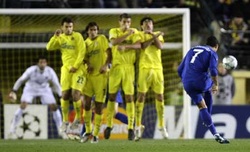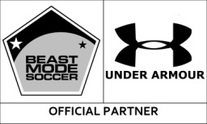Watch Ronaldo, Beckham, Roberto Carlos... there is nothing more satisfying than bending the ball from free-kicks over the wall into the back of the net. Get yourself down to the soccer field, so that at the next soccer training session you can show your free-kick takers how it's done.
Soccer coaching tips to bend the ball
Your players will love these soccer drills. They will be able to change the direction of the ball mid-flight. Get your players to perform this skill from a free-kick. It’s easiest to do when the ball is stationary.
Soccer coaches – try this yourself
1. Positioning: Put a ball on the edge of the area, as in the diagram below. Approach the ball at an angle running across the direction of the goal, in a relaxed movement, not too fast.
2. Contact: If you hit the ball straight it would head for the corner flag. Instead, hit the ball with the inside of your big toe, just where your toe ends and your foot begins. The impact will roll the ball along the inside of your foot. Your foot meets the ball in the bottom corner. Always use bottom left or right depending on which foot you use.
3. Movement: Your standing leg should not move and should still be pointing at an angle away from the target. Swing your kicking leg in towards the goal, without bending it. Now you’re doing exactly what David Beckham, Ronaldinho and Frank Lampard do day-in and day-out on the soccer training pitch.
4. Ball flight: Because you are hitting the ball from underneath, there will be sufficient lift to take the ball up and over the wall. As your foot comes across and around, you create ball spin which makes the ball bend and dip. You can get extra height by leaning your shoulders back.
The SMART way to bend free-kicks:
SPECIFIC
MEASURABLE
AGREED
REALISTIC
TIMED
The SPECIFIC target for your player is to bend free-kicks into the goal.
Make it MEASURABLE by telling your players you want them to successfully bend five out of ten free-kicks.
AGREE with them that this is to happen during the training drill.
Is five REALISTIC? It depends on the player.
Make it TIMED by agreeing it should happen over three training drill sessions.
Tailor this SMART session to your individual players and get them to tell you if they reach the drill target.
Soccer coaching tips to bend the ball
Your players will love these soccer drills. They will be able to change the direction of the ball mid-flight. Get your players to perform this skill from a free-kick. It’s easiest to do when the ball is stationary.
Soccer coaches – try this yourself
1. Positioning: Put a ball on the edge of the area, as in the diagram below. Approach the ball at an angle running across the direction of the goal, in a relaxed movement, not too fast.
2. Contact: If you hit the ball straight it would head for the corner flag. Instead, hit the ball with the inside of your big toe, just where your toe ends and your foot begins. The impact will roll the ball along the inside of your foot. Your foot meets the ball in the bottom corner. Always use bottom left or right depending on which foot you use.
3. Movement: Your standing leg should not move and should still be pointing at an angle away from the target. Swing your kicking leg in towards the goal, without bending it. Now you’re doing exactly what David Beckham, Ronaldinho and Frank Lampard do day-in and day-out on the soccer training pitch.
4. Ball flight: Because you are hitting the ball from underneath, there will be sufficient lift to take the ball up and over the wall. As your foot comes across and around, you create ball spin which makes the ball bend and dip. You can get extra height by leaning your shoulders back.
The SMART way to bend free-kicks:
SPECIFIC
MEASURABLE
AGREED
REALISTIC
TIMED
The SPECIFIC target for your player is to bend free-kicks into the goal.
Make it MEASURABLE by telling your players you want them to successfully bend five out of ten free-kicks.
AGREE with them that this is to happen during the training drill.
Is five REALISTIC? It depends on the player.
Make it TIMED by agreeing it should happen over three training drill sessions.
Tailor this SMART session to your individual players and get them to tell you if they reach the drill target.


 RSS Feed
RSS Feed

